An interesting thing happened this morning.
I had planned on publishing the post below, because I felt it could help some people during this period. But then I went to the bathroom, opened my phone and saw this Instagram post by Mark Manson that had exactly the same title. It’s fascinating how different people often get the same ideas / impulses.
I felt a bit stupid about it and almost wasn’t going to publish it anymore. But then I realized that.
- My book list is completely different. It may as well be an “appendix” to Mark’s list.
- If a writer of his level posts this idea as well, it was probably a good idea in the first place and I should still publish it.
Anyway…do you ever feel like the world is going to hell and a handbasket? 😉
When you look around, do you see evil, greed, corruption and misery everywhere?
Inequality, an oppressive elite maintaining systems to enslave people, cultural brainwashing, humans destroying the climate, climate destroying the humans, …
If so, I understand. I’ve looked at the world this way for a very long time. And it’s also not entirely inaccurate. But it’s a worldview that ignores a lot of important facts about reality. And in doing so, it may not be the best one to have for your own mental health.
Most people in this world tend to see the state of things as worse than they are. Throughout history, people have always been saying that “the world is going to shit”. This is normal. Our brains are wired to pay more attention to what’s going wrong around us than what’s going right . Because this is beneficial for our survival. But seeing things as worse than they are can also lead to unnecessary stress, worrying and depression.
Common advice to prevent this is to “just think more positively”. But I don’t believe that’s very helpful. What if in order to employ positive thinking, you have to lie to yourself all the time? That would just make you delusional.
A better solution in my option, is to create a realistic and wholesome world view that includes both the bad and the good. Since we all tend to see the world as worse than it is, for most people this will already be a big upgrade in life satisfaction.
The books below all do a great job at teaching you to see the world, humans or history in a different light. Without denying the existence of suffering or brainwashing you into any delusional positive beliefs.
1. “Factfulness ” (by Hans Rosling)
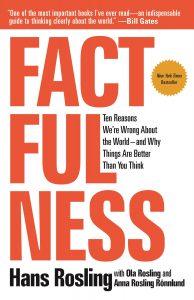
This book is a great one to start with. Even if only for the first chapter: It starts with a pop quiz about how bad things really are in the world.
This quiz tests your knowledge on anything from poverty to diseases to environmental issues. My girlfriend and I both thought we were pretty knowledgeable in these areas. But boy, were we wrong!
The rest of the book paints a detailed picture of how the state of these things actually is right now. And it does through numbers, statistics and helpful comparisons that help you relate the data to situations you know from your own life. Did you know your grandma probably lived in worse circumstances than many people who you think are currently starving to death?
2. “The World Until Yesterday” by Jared Diamond
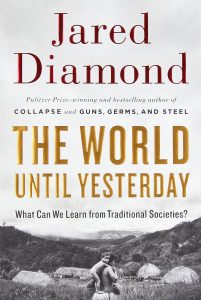
Have you ever longed for a simple life away from the dreadful structures of society Back to nature? Back to what’s real and what matters? No additives in your food, no boring 9 to 5, no bureaucracy…
This book, written by an anthropologist who spent years in various traditional societies around the world, gives an unbiased comparison between life in tribes, life in the modern world, and everything in between. The good, the bad and the ugly.
Many of the subtle (and not so subtle) implications of living in these different situations would never occur to anyone who hasn’t lived in them. And if you are a dreamer, longing for “the simple life”, they will for sure take you by surprise. For better or worse.
3. “Sapiens: A Brief History of Humankind” by Yuval Noah Harari
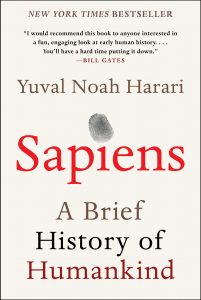
Did you know that you are likely part of a religious movement that you don’t even know you believe in?
Did you ever hear of the plant that has domesticated humans?
Or that there is a way to look at the horrors of industrial farming in which it is beneficial for the pigs and cows it abuses (a surprising idea to find in a book written by a Vegan)?
While on the surface this is just a history book, it helps you make sense of many things about our species that aren’t all that obvious from a first glance. I remember reading this book the year it came out and having an unusually large amount of moments where I felt like light started shining in a part of my brain where it was previously dark. And while I don’t think this was the intention behind the book, all those moments led to a much brighter world view.
Bonus: If you enjoyed Sapiens, you may also enjoy Harari’s second book “Homo Deus”)
4. “The Book of Not Knowing” by Peter Ralston
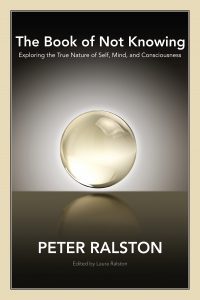
This is a seriously dense book about everything and nothing. But most of the things you’ll learn from it, you will not find written in the lengthy sentences. Instead, you’ll find them in yourself. It’s definitely in my top 3 of books I have recommended to my friends the most. But it takes quite some time to plough through its pages.
What I love so much about this book is that while most books about spirituality try to convince you of new “airy-fairy” beliefs, this book does the exact opposite: It makes you question things you never even considered questionable. And it doesn’t attempt to answer any of the questions it generates. So as the title implies, the book literally leaves you with less knowledge than you had when you started reading it. This can feel a bit unsettling at times. Because it’s the opposite of what we usually read books for. But once you get comfortable with it, it has the power of changing the way you look at everything.
Bonus: If after losing so much “knowledge” you’d still like to unlearn some more, Ralston’s next 2 books: “Pursuing Consciousness” and “The Genius of Being” are great as well, though they do repeat some of the concepts discussed in this one.
5. “The Story of Us” by Tim Urban
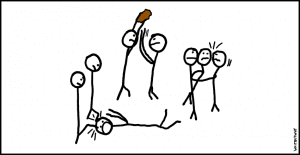
“The story of us” is not really a book. It’s a series of blog posts. But they are so long they may as well be a series of short books. The series is as of yet unfinished. But the impact it has had on my thinking is amazing. As usual, Tim’s writing style manages to capture complex intellectual ideas in hilarious third-grade stick figure drawings that somehow help things make a lot of sense.
While many ideas presented in the first 2-3 posts will be already well known to you if you are an avid reader of my blog, it’s necessary to at the start so you can familiarize yourself with the foundational concepts the rest of the series is built on.
One of the things I loved the most about “The Story of Us” is how it teaches you to shift your focus away from “What do I think?” towards “How do I think?”. Which makes all the difference when it comes to forming a more accurate view of the world.
Bonus: If you liked this one, “What If All 7.1 Billion People Moved To Tunisia?” is a great short post by the same author that reminded me a bit of the “Factfulness” book I recommended earlier.
6. “Trust Me, I’m Lying: Confessions of a Media Manipulator” by Ryan Holiday
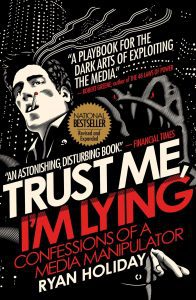
A bit of an odd duckling in this list, as it’s not a very “happiness-inducing” book. But since the goal is to develop a more realistic and wholesome worldview, I couldn’t leave it out.
You may know Ryan Holiday from his famous books about stoicism. But before he was a full time writer, he was a marketer of “the worst kind”. This book details how he was able to influence the way people think and even have fake news turn into events actually happening as reality caught up with his fiction.
While initially this book may lead you to have a more negative view of the way things work in the world, I believe that the end result is positive:
It helps you reconsider the way all information is presented and consumed by you on a day to day basis. Which can free you from the grasp of fear-based marketing and politically motivated misinformation. We all know these things exist. But how do you recognize them without actually knowing how to do it?
Given the amount of information that gets thrown in our direction these days, it’s definitely a must read.
Bonus: If you speak Dutch, there is a great book by Ruben Mersch called “Oogklepdenken” which explains how even many scientifically accurate studies can still be manipulated into misinformation. Unfortunately I haven’t heard of an English translation yet)
7. “The Moth Presents All These Wonders: True Stories About Facing the Unknown” by Catherine Burns
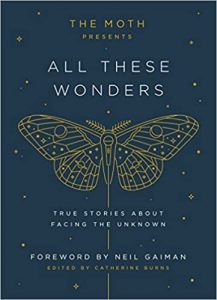
This book is a collection of short stories from random people’s lives. Some stories are sad, some are funny, some are boring, some elicit an emotion you haven’t felt or found a word for yet. What’s so amazing about it is that you get little glimpses into the lives of people who you would usually just cross on the street and never think about. All these lives are so different from one another and the stories so beautiful, that you’ll never look at a stranger the same way again.
My favorite story from this book (that I must’ve told everybody I met while reading this): A child soldier from Sierra Leone who migrated to the US and kicked all the other kid’s asses at paintball. But didn’t want to tell them why he was so good at it out of fear of losing the first “normal” friendships he made in his new life.
8. “The Power of Now” by Eckhart Tolle
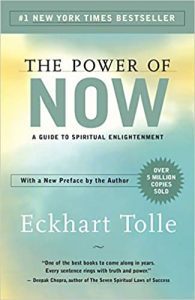
The Power of Now is a bit of a “book recommendation cliche”. And because of that, many people would call it overrated.
But if you haven’t read it, it may still prove its worth. Most people reduce the message book to the simple idea of “living in the present, not the past or future”. But when you do so, you really ignore a lot of the important and inspiring paragraphs in it. Overall, what it taught me most is to look at things the way they are instead of looking at things through the concept you’ve created about them in your mind.
Bonus: If you liked this book, its successor “A New Earth” expands some of its concepts on a much larger scale, which will definitely influence your world-view as well. I particularly liked the idea of “collective egos” and how they relate what happens in society and international politics.
9. Wildcard: Any Book That You Think Is Absolute Horseshit
One of the best things you can do to break through your own dogmatic beliefs, is to read a book that proclaims the opposite of what you believe in.
Do you vote left? Read books about why you should vote right. Do you vote right? Indoctrinate yourself into communism.
Believe Trump is the anti-christ? Read a list of reasons why he’s the best president ever.
Are you sexually conservative? Read books that endorse the most depraved orgies you can imagine. Are you a proud slut? Read about the importance of abstinence and the values of marriage.
Are you into conspiracy theories? Read some debunking articles. Do you believe the mainstream media? Go read some conspiracies.
Feminist? Read a book about why feminism is evil. Are you a red-piller? Then read about why feminism is the salvation of society.
Look for books about why your religion (or your atheism is wrong) and devour them, slowly considering each of their carefully crafted arguments.
Google history books told by “the other side”, in which your country is the evil oppressor or the defeated evil.
And when you do so, try to consider that perhaps both your world view and the one of the writer are partly wrong and partly right. That the truth is often complex, rarely black and white.
Some of the most liberating things I ever read, I found through reading books or articles that challenged my own beliefs.
And in a time when social media algorithms filter information based on your own liking, I think it’s of vital importance that we all do so.
So now if you’ll excuse me, I’m about to start reading an article called “Why You Shouldn’t Change the Way You See the World” 😉